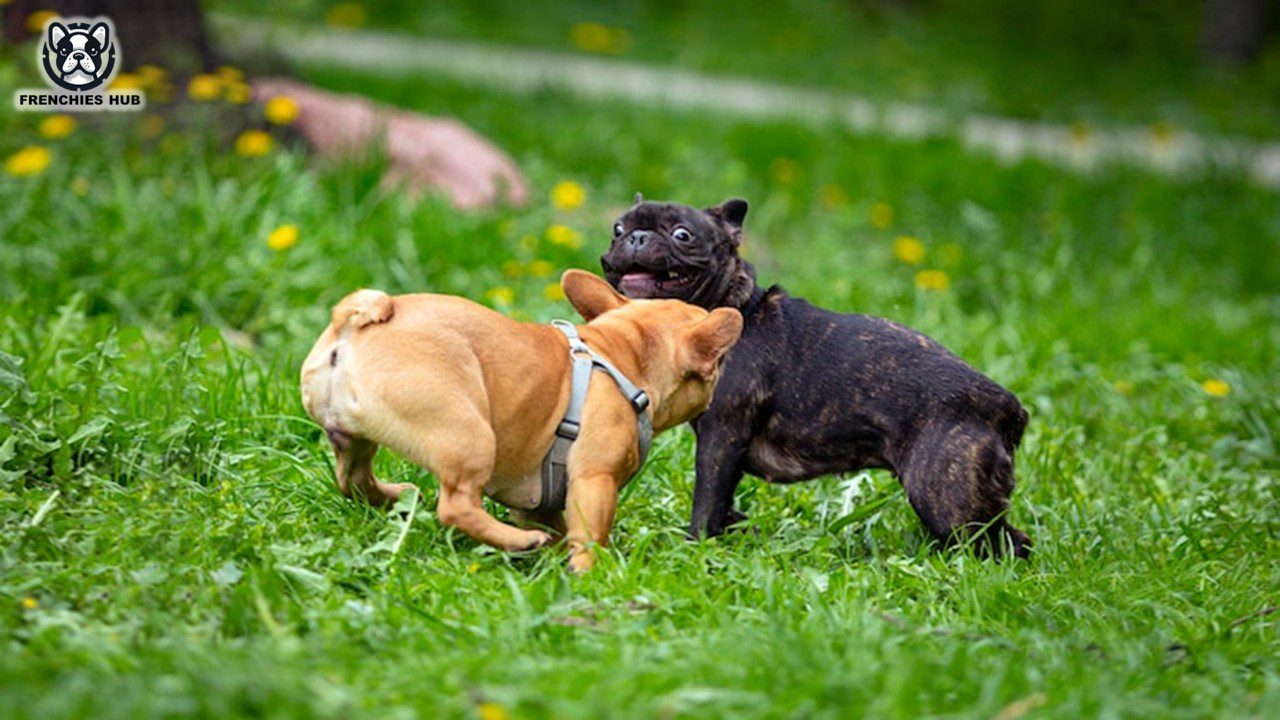From my time spent with these charming companions, I’ve learned that the French bulldog is more than just an adorable face; it’s a breed that thrives on companionship and understanding. It’s important to recognize the role of socializing in their lives. Socializing a French bulldog is not just a beneficial activity; it’s a necessity. This process is a great way to make them comfortable around other dogs and strangers, which, in many cases, could save their life if they were to find themselves in a dangerous situation.
A common misconception is that as long as your dog may look and feel healthier, there’s no urgency in social interaction. However, this outlook could do them more harm than good. Through this article, we will learn the dangers of not socializing your French bulldogs and why embracing this aspect of their care can lead to a well-adjusted and happy pet.
The Perils of Skipping Socialization for French Bulldogs
Drawing from my own journey with a delightful yet initially nervous French bulldog, the importance of early socialization cannot be overstated. When not socialized, these charming dogs can experience significant discomfort in the presence of other animals, turning what should be joyful walks in the park or leisurely strolls down the street into a problem. The sight of other dogs or the hustle and bustle of the public can make them scared, a stark contrast to the comfortable and confident demeanor we all wish for our pets.
Navigating Social Situations: Introducing Your Frenchie to the World
The transformation of my Frenchie from a scared pup to one who eagerly meets new people and other dogs was nothing short of remarkable. It underscores the helpful impact of gradually getting them used to being around various animals and environments. Walks where they can encounter the world at their own pace, experiencing new sights and sounds, are invaluable. This not only alleviates their fear but also significantly reduces the discomfort they feel in new situations, making meeting and mingling an enjoyable experience for both pet and owner.
Understanding Reactions: The Impact of Not Socializing
Through my experiences with my French bulldog, it’s become clear how crucial early socialization is. Without it, they may react to everything around them. For example, the neighbor’s cat could become an object of fierce territorial aggression. The mailman? Perceived as a threat. And my husband coming home from work? Mistaken for a predator that needs immediate addressing.
It’s important to recognize that every dog is different. Some might be more sensitive, while others display a higher tolerance for human contact. Even the most laid-back pup needs time to get used to new things in order to function in a world populated by humans.
When a French bulldog is not socialized properly, their negative reactions when they encounter people or other animals in public places can become problematic. Especially when they’re on a leash and can’t run away from what frightens them, it creates a situation where both the dog and the public are at risk. Early socialization helps mitigate these risks, allowing for a harmonious existence within a populated world.
The Consequences of an Unsocialized French Bulldog
Owning a French bulldog means welcoming a new part of the family. These dogs accompany us everywhere – from leisurely days at the park, to routine visits to the vet, and even on vacation. However, the ease with which they adapt to and behave in these situations hinges significantly on their socialization during the early stages of their life.
Without being properly socialized, a French bulldog’s behavior can become difficult to control as they grow older. They may become aggressive towards other dogs or people, or perhaps afraid of them. In some cases, they might show disinterest in interacting with them altogether. The foundation for a well-behaved dog is laid early in life through exposure to a variety of social situations.
Ensuring your French bulldog is exposed to diverse environments and beings from a young age is crucial. It teaches them how to be comfortable and confident, not just within the home but in the world at large. The alternative – a dog that is harder to control, potentially aggressive, afraid, or uninterested in social interaction – highlights the vital role socialization plays in the development of a sociable, well-adjusted pet.
Overcoming Fear: The Risks of Unsociable Frenchies
In my journey with a French bulldog who isn’t socialized, I’ve seen firsthand how fearfulness can overshadow their otherwise joyful demeanor. These dogs might become fearful of other dogs, people, and new situations. It stems from not understanding how to act in various scenarios, particularly poignant when they haven’t been properly socialized as puppies.
A fearful Frenchie isn’t just a timid pet; it’s a dog that could become fearful, leading to aggression. This aggression isn’t innate but born out of fear and uncertainty. When afraid of other dogs or people, a vicious cycle begins. It’s hard to break this cycle once it starts, as fearfulness can lead to your Frenchie getting into fights, making it more likely they will become aggressive in the future.
It not only helps prevent fearfulness but also ensures that your French bulldog can enjoy interactions rather than fear them. Ensuring they are properly socialized from a young age is key to avoiding this vicious cycle of fear and aggression.
The Homebound Dilemma: When Frenchies Resist the Outside World
In the world of French bulldogs, early socialization plays a pivotal role in shaping their comfort and confidence, not just within the home but also in the great outdoors. A French bulldog that is not socialized might find the outside world intimidating, becoming scared of new people and reluctant to venture beyond the familiar threshold of their home. This hesitation can manifest in problems that affect both the dog and owner.
A Frenchie not liking to leave the home is a sign that he lacks confidence in going out in public. This can place limitations on your ability to ensure your dog gets the necessary exercise and stimulation. It’s important to understand that mental stimulation is as crucial as physical exercise for these dogs. Without it, they might exhibit behavioral problems such as excessive barking, anxiety, or even chewing on furniture and other items around the house.
When Noise Becomes a Nuisance: The Impact of Sound Sensitivity
Having observed the journey of a dog that was not socialized early, I’ve seen how it can become overly sensitive to sounds, a situation that poses risks not just to the dog but to others around it. This sensitivity can lead to dangerous scenarios where the dog might start barking uncontrollably at loud noises or become afraid of certain noises like fireworks or thunderstorms.
It’s important to take the time to teach your French bulldog how to respond appropriately to different situations involving noise. Failure to do so may not only lead to a dog that’s aggressive but also one that’s skittish, reacting out of fear rather than understanding. Early socialization is key in helping them navigate a world full of startling sounds, from the everyday hustle and bustle to the occasional celebration that lights up the sky.
Essential Strategies for Early Socialization of French Bulldogs
Ensuring your French bulldog becomes a well-adjusted canine citizen involves embracing a challenge that requires a thoughtful approach. When your pup demonstrates no interest in meeting new people or mingling with other animals, adopting the right way to introduce them to various surroundings becomes crucial. Embarking on the path to successfully socialize your French bulldog involves a blend of patience, strategy, and adaptability, with each step tailored to foster comfort and confidence.
Begin With Baby Steps
The initial phase of socialization should be gentle and gradual. Starting small is critical with French bulldogs, given their unique temperament and sensitivity. Introducing your pet to one person at a time helps in creating a comfortable environment for them to adapt without feeling overwhelmed. This careful, measured approach ensures that each new encounter is a building block towards a more sociable pet.
Engage in Regular Walks
Walks are not just physical exercises; they’re opportunities for sensory and social exploration. Regular outings, ideally twice a day, expose your French bulldog to a spectrum of interactions with people and other dogs in various settings. Navigating through unfamiliar areas, such as busy streets or parks, while adhering to leash laws, enriches their social and environmental understanding.
Cultivate Patience
Patience is a virtue, especially in the context of socializing a French bulldog. The desire for quick progress is understandable, but real, lasting adjustment is a time-consuming process. Allowing your dog the space to warm up at their own pace, and being patient until they signal their readiness for more interaction, lays a solid foundation for their social development.
Implement Positive Reinforcement
Acknowledging and rewarding your French bulldog’s good behavior and positive interactions with treats and praise solidifies desirable social behaviors. This reinforcement is essential for encouraging friendly and appropriate responses to a wide range of social scenarios.
Invest Quality Time
Spending quality time engaged in activities that capture their interest—from outdoor fetching games to indoor hide-and-seek—enhances your bond and provides mental stimulation. This engagement is key to making socialization a positive and enjoyable aspect of their daily routine.
Adhering to these enriched strategies for socializing your French bulldog not only ensures their growth into sociable and confident companions but also deepens the bond you share, making every new encounter an avenue for joyful exploration and mutual learning.
Final Thoughts on Nurturing Sociable Frenchies
The journey of socializing puppies, especially French Bulldogs, carries proven benefits that extend far beyond their early months. The process of creating a dog that can handle unexpected changes in their environment—be it the arrival of a new baby in the house or a quick change in location—is invaluable. It’s essential to take the time to expose your Frenchie to different people and other animals. This foundational experience cultivates a well-rounded pet, ready to embrace life’s diversities as an adult.
Embracing this holistic approach to puppyhood ensures that your French Bulldog grows into a companion not only equipped to deal with various social situations but also one that thrives in them. This investment in their developmental years promises a future where they are not just pets but integral and adaptable members of your family and society.

